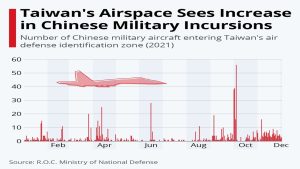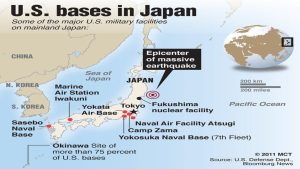
Will Taiwan be the Next Conflict Zone ?

The geo-political landscape of the World has undergone a change in the past few months. Potential hot spots have transformed into major conflict areas as is evident in regions of Europe, Middle-East and Africa. The cold war era was considered buried, done and dusted; however, the emerging political landscape seems to suggest a kind of revival of this phenomenon. Are we then seeing the portents of a Cold War 2.0?
Changing Political Landscape
A new power bloc consisting of Russia, China, Turkey, Iran and Pakistan seems to be emerging. The argument goes if NATO could form an alliance why not these nations. The bigger question which is now emerging is that after Ukraine, where will we see the next conflict? Are the bigger and stronger nations getting into a predator mindset to subjugate smaller and weaker nations? The recent announcements of Germany and Japan to bolster their military capabilities are surely a sign of troubled times ahead. Do we then see the conflict now moving on to the South China Sea with Taiwan in focus? Will the Chinese move in sensing a greater opportunity, as is often said of them that they always find “An Opportunity in Chaos”.
Latest Developments

Recently, there were reports of scores of warplanes and drones entering Taiwan’s Air Defence Zones. China seems to be stepping up the heat on Taiwan. According to the Taiwanese Ministry of Defence there have been more than 200 Chinese aircraft entering Taiwan air space since the past one year. Today, the tensions between China and Taiwan are worse than ever as recently stated by Chiu Kuo Cheng, Taiwanese Defence Minister, “For me as a military man, the urgency is right in front of me. The situation is most serious in more than 40 years, since I joined the military”. He further added that China is preparing and would be capable of launching an invasion on Taiwan by the year 2025 with minimum cost and attrition. Clearly, the Chinese strategy of winning the war without firing a bullet seems to be working.
China is also not too happy with the periodic military exercises Taiwan is undertaking with countries like France, Netherlands and New Zealand amongst others. Beijing is also opposed to Taipei having any official diplomatic exchanges with other countries. United States is Taiwan’s main supplier of defence equipment. However, Taiwan military would be no match to China’s military might and therefore, in the event of a war with China, it would become imperative for Taiwan to seek outside support especially from the US.
Impact of Ukraine Conflict on China’s Strategy
China was certainly emboldened to see the US and NATO response of not enjoining the conflict in Ukraine. Some may argue that its long stated objective of annexing Taiwan seems to have been given a boost. However, in the same context the kind of nationalist fervour of the local population of Ukraine to give resistance to the Russian forces is also unprecedented and must be taken into account since the same could be expected from the Taiwanese, who have a deep dislike for the Chinese.
Another important impact which would weigh on the mind of the Chinese leaders would be the kind of sanctions which have been imposed by the West on the Russians. The Chinese economy, possibly could ill afford this scenario. All these factors would definitely be weighing on the mind of Xi Jinping in deciding his future course of action on Taiwan.
Scenario Building in the Event of Chinese invasion on Taiwan
A lot of strategic analysts seem to have divergent opinion on whether we would see a similar US response as Ukraine, when applied to an attack on Taiwan. In my opinion, it seems unlikely that this template could be applied on Taiwan as the two situations have different geo-political implications.
The US has much in stake in Taiwan as it considers this as a region which if dominated could also be a counter to the Chinese hegemonistic designs. Further Taiwan is a major semi-conductor chip manufacturing base which gives an added advantage. It is therefore not surprising that the US and Taiwan have a “Taiwan Relationship Agreement”, which is akin to a de-facto alliance necessitating American intervention in case Taiwan is threatened.
The US has already established a military alliance, “AUKUS”, which is a trilateral security pact between Australia, the United Kingdom, and the United States. This is predominantly, China centric and aims to augment the military might of the US when confronted with any issue in the Indo-Pacific or the South China Sea.

The US could also use Japan to base its military resources to further its operations towards Taiwan, if the need arises. The above graphic depict US bases in Japan.
In the present context it seems that China would continue with its policy of “coercion without violence”. It would use all the mechanisms at its disposal such as diplomatic, economic, political and military in order to pressurise Taiwan to accept re-unification with the Chinese mainland.
Xi Jinping is surely watching these developments very closely as it is becoming apparent that the US and NATO are unable to influence the situation in Ukraine. It also leads us to a very disturbing scenario of North Korea, Iran or China flexing its muscles considering a very low probability of deterrence. The recent missile attack by Iran on the Iraqi town of Idris is an indication of things to come.
The US is carrying out hectic parleys with its allies to bring in maximum pressure on Russia to end this conflict. It has even initiated a dialogue with China to deter them from helping Russia in any way as well as refrain from any major activity towards Taiwan. However, no one has so far been able to read the Chinese mind. It would, therefore be not out of place to assume that China could surprise the entire world and launch an attack on Taiwan. The US and the western world would need to constantly monitor Chinese activity and be wary of the Chinese designs in the coming weeks.
The lesson for India from the experience of the Ukraine conflict is that indigenisation to augment our military and economic capabilities is the key to our future growth and well being as a nation.
*****************
Disclaimer
The opinions expressed in this article are the author’s own and do not reflect the views of Chanakya Forum. All information provided in this article including timeliness, completeness, accuracy, suitability or validity of information referenced therein, is the sole responsibility of the author. www.chanakyaforum.com does not assume any responsibility for the same.
Chanakya Forum is now on . Click here to join our channel (@ChanakyaForum) and stay updated with the latest headlines and articles.
Important
We work round the clock to bring you the finest articles and updates from around the world. There is a team that works tirelessly to ensure that you have a seamless reading experience. But all this costs money. Please support us so that we keep doing what we do best. Happy Reading
Support Us





















POST COMMENTS (6)
Kalidan Singh
Ashok Bijalwan
Raj Jagga
SR Gupta
JS Gulati
Maj Gen PPSINGH